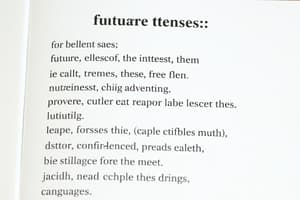Podcast
Questions and Answers
To indicate that an action will be in progress at a specific time in the future, use the ______ tense.
To indicate that an action will be in progress at a specific time in the future, use the ______ tense.
future continuous
To express an action that will be completed before a specific point in the future, you should use the ______ tense.
To express an action that will be completed before a specific point in the future, you should use the ______ tense.
future perfect
If you want to describe an action that will have been in progress for a duration leading up to a specific future time, the appropriate tense to use is ______.
If you want to describe an action that will have been in progress for a duration leading up to a specific future time, the appropriate tense to use is ______.
future perfect continuous
The phrase going to typically suggests a ______, while will can imply a more spontaneous decision.
The phrase going to typically suggests a ______, while will can imply a more spontaneous decision.
Mastery of future tenses requires consistent ______, including creating examples and analyzing contexts.
Mastery of future tenses requires consistent ______, including creating examples and analyzing contexts.
The tense used to describe an action already in progress at a specific time in the future, such as 'They ______ tennis tomorrow afternoon', is the Future Continuous tense.
The tense used to describe an action already in progress at a specific time in the future, such as 'They ______ tennis tomorrow afternoon', is the Future Continuous tense.
To express that you anticipate having completed a task by a certain deadline, like 'I ______ this report by Friday', you would use the Future Simple tense.
To express that you anticipate having completed a task by a certain deadline, like 'I ______ this report by Friday', you would use the Future Simple tense.
The Future ______ tense is used to describe an action that will have been completed before a specific time in the future, emphasizing the completion of the action.
The Future ______ tense is used to describe an action that will have been completed before a specific time in the future, emphasizing the completion of the action.
When describing a situation where an action has been ongoing for a certain duration leading up to a point in the future, as in 'By next year, I ______ in this city for ten years', the appropriate tense is Future Perfect Continuous.
When describing a situation where an action has been ongoing for a certain duration leading up to a point in the future, as in 'By next year, I ______ in this city for ten years', the appropriate tense is Future Perfect Continuous.
The statement 'She ______ continuously for three hours by midnight' uses the Future Perfect Continuous tense, emphasizing the duration of the study session up to midnight.
The statement 'She ______ continuously for three hours by midnight' uses the Future Perfect Continuous tense, emphasizing the duration of the study session up to midnight.
Predicting that 'She ______ pass the exam' is an example of using the Future Simple tense to express a likely outcome.
Predicting that 'She ______ pass the exam' is an example of using the Future Simple tense to express a likely outcome.
To indicate that 'By the end of the week, we ______ the project', you should use the Future Perfect tense to show completion of the project before that time.
To indicate that 'By the end of the week, we ______ the project', you should use the Future Perfect tense to show completion of the project before that time.
When volunteering assistance by saying 'He ______ you if you need it', the Future Simple tense is used to make an offer.
When volunteering assistance by saying 'He ______ you if you need it', the Future Simple tense is used to make an offer.
Flashcards
Future Simple
Future Simple
Indicates a basic future action without specifics.
Future Continuous
Future Continuous
Describes a future action that will be in progress at a specific time.
Future Perfect
Future Perfect
Refers to an action that will be completed before a future time.
Future Perfect Continuous
Future Perfect Continuous
Signup and view all the flashcards
'Will' vs 'Going to'
'Will' vs 'Going to'
Signup and view all the flashcards
Future Simple Formation
Future Simple Formation
Signup and view all the flashcards
Future Continuous Formation
Future Continuous Formation
Signup and view all the flashcards
Future Perfect Formation
Future Perfect Formation
Signup and view all the flashcards
Future Perfect Continuous Formation
Future Perfect Continuous Formation
Signup and view all the flashcards
Study Notes
Future Tenses: Explanation and Examples
-
Future Simple: Used to denote an action that will happen at a specific time in the future.
- Formation: Will/shall + base form of verb
- Usage: Expressing a simple future action or intention, predictions, promises, or offers.
- Examples:
- I will go to the store tomorrow. (Simple future action)
- She will likely pass the exam. (Prediction)
- We shall be there on time.
- He will help you if you need it. (Offer)
- I will finish this report by Friday.(Specific time in the future)
Future Continuous:
- Formation: Will/shall be + -ing form of verb
- Usage: Used to describe an action that will be in progress at a specific time in the future. Implies continuation of the action during a future period.
- Examples:
- They will be playing tennis tomorrow afternoon. (Action ongoing)
- I will be working on this project until midnight. (Implies ongoing work)
- She will be studying for the test from 9 am to 12 noon. (Continued action during a period).
Future Perfect:
- Formation: Will/shall have + past participle of verb
- Usage: Used to describe an action that will be completed before a specific time in the future. Often related to a timeframe in the future.
- Examples:
- We will have finished the project by the end of the week. (Action completed before a certain time).
- By next year, he will have traveled to many countries. (Action completed in the past before a future time)
- By August, she will have been in this country for five years.
Future Perfect Continuous:
- Formation: Will/shall have been + -ing form of verb
- Usage: Used to describe an action that will have been in progress for a period of time up to a specific time in the future. Focuses on the duration of the action.
- Examples:
- By the end of the month, they will have been working on this project for three weeks. (Duration of work until a point in the future)
- By next year, I will have been living in this city for ten years. (Duration from a past time up to a future time)
- She will have been studying continuously for three hours by midnight. (Continuous action with the future as a reference point).
Key Differences and When to Use Each Tense
- Future Simple: Basic future action
- Future Continuous: Future action in progress
- Future Perfect: Action completed before a specific future point
- Future Perfect Continuous: Action in progress for a period up to a specific future point
Common Mistakes and Tips for Avoiding Them
- Confusing "will" and "going to": "Going to" implies a plan or intention. "Will" can be more spontaneous. Focus on the nuance of the action.
- Overlooking the nuances of time: Pay attention to when the action takes place. Future Perfect versus Future Simple could mean the difference between the action being completed before a future time or simply taking place.
- Practice: The best way to master future tenses is through consistent practice. Create your own examples, try to understand the contexts, and compare to similar English sentences.
Studying That Suits You
Use AI to generate personalized quizzes and flashcards to suit your learning preferences.




